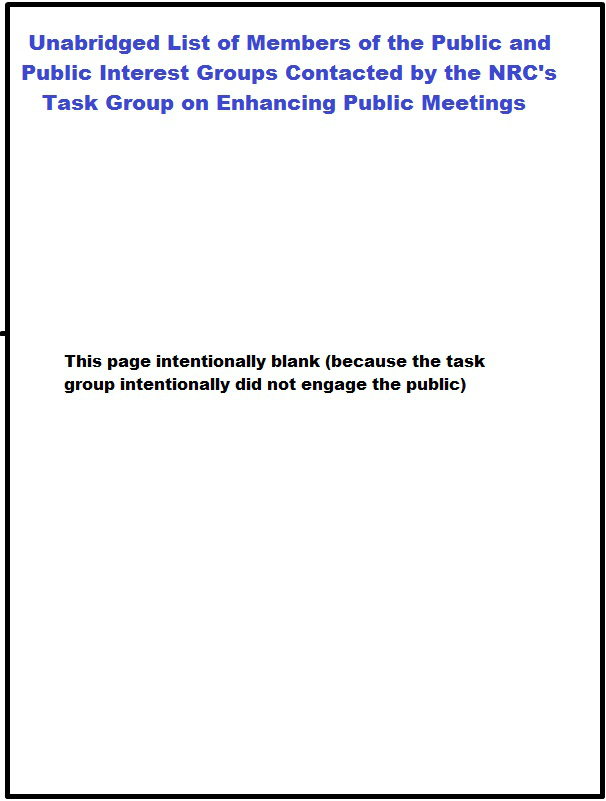Nuclear Energy Activist Toolkit #58
By memo dated January 29, 2015, a task group of twenty individuals within the NRC submitted its report to the agency’s Executive Director for Operations on enhancing public meetings. The task group was created in response to written direction dated March 5, 2014, (ADAMS ML14070A070, but not publicly available in ADAMS) from the NRC Chairman. The task group made five recommendations to enhance public meetings conducted by the NRC:
- Create a Center of Excellence (CoE, moving the agency one acronym closer to winning something (WS)), to serve as a resource of information, advice, and support for staff planning, executing, and evaluating public meetings.
- Create a public meeting qualification program for NRC staff that plan, conduct, and participate in public meetings.
- Develop and implement a comprehensive set of agency-wide guidance on conducting public meetings.
- Develop or update guidance to help stakeholders effectively participate in public meetings.
- Establish more effective ways to measure the success of public meetings.
The NRC hired a consultant to examine how other organizations engage the public and outline successful models. The consultant’s report identified best practices such as:
- “Transparent communication about decisions”
- “Allowing public input to shape the project”
- “Thinking about public engagement/public involvement as opportunities for meaningful dialogue”
- “Opportunities for the public to provide direct input”
The consultants informed the NRC that a recurring theme among the organizations it examined “is having an open process where all views are exchanged and considered.”
Bottom Line
The report stated “Staff must be open to stakeholder views” and “The agency, as part of its decision-making process, must reach out to affected and interested parties and invite their involvement.” Reflecting these principles, Fig. 1 shows an unabridged listing of the members of the public and public interest groups that the NRC’s task group contacted during its deliberations:
The task group did not reach out to any members of the public – not a single one – when considering ways to enhance meetings the agency conducts with the public.
Actions may speak louder than words, but inactions speak the loudest.
The NRC would not even consider examining how to enhance its meetings with the nuclear industry without soliciting input from those targeted stakeholders.
Why then would the NRC examine how to enhance its meetings with the public without soliciting input from members of that targeted audience?
Reason 1: The NRC does not value public input.
Reason 2: The NRC does not value public input.
Reason 3: The NRC does not value public input.
The NRC’s efforts to enhance public meetings cannot succeed until the agency truly accepts that the meetings must allow two-way communications. The meetings must become more than opportunities to listen to NRC’s representatives. The NRC must value public input – really value it and not just list is as an objective – and structure its meetings to both solicit input and properly handle it.
The UCS Nuclear Energy Activist Toolkit (NEAT) is a series of post intended to help citizens understand nuclear technology and the Nuclear Regulatory Commission’s processes for overseeing nuclear plant safety.

